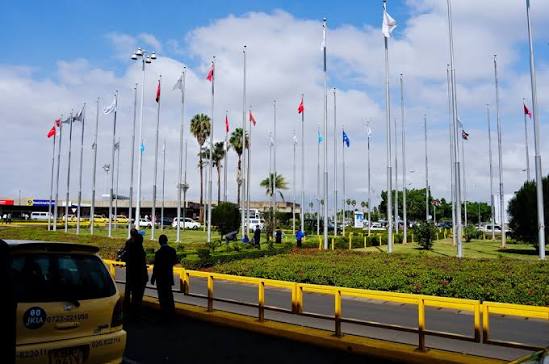The Federal Airports Authority of Nigeria (FAAN) has taken a decisive step to reshape the nation’s cargo ecosystem, convening a high-level stakeholders’ engagement session at Providence Hotel, Ikeja. Organised by FAAN’s dynamic Directorate of Cargo Services, the session drew regulators, logistics operators, and industry experts to deliberate on strategies for creating a world-class and environmentally sustainable air cargo sector in Nigeria. The forum reflected a unified commitment to enhancing operational efficiency, regulatory compliance, and global competitiveness

.Dr. Alexander Nwuba, President of the Aircraft Owners and Pilots Association of Nigeria, delivered a comprehensive paper outlining the 6 pillars of cargo transformation. He stressed that air cargo is a critical driver of trade, economic diversification, and national development, and that Nigeria’s strategic location, expanding manufacturing base, and rich agricultural resources uniquely position it to become Africa’s leading cargo hub.

A cross section of participants at the Federal Airports Authority of Nigeria (FAAN) cargo engagement in Lagos. Managing Director FAAN, Olubunmi Kuku represented by Director Special Duties, Obiagelli Orah, Director Cargo Services, Lekan Thomas among othersProposed Near-Perfect Cargo EcosystemHighlighting the first pillar, Dr. Nwuba emphasised the urgent need for modern, green infrastructure across Nigerian airports. He advocated for cargo terminals equipped with advanced cold-chain facilities, automated handling systems, and renewable energy solutions such as solar panels. He noted that integrating natural ventilation, daylighting, and rainwater harvesting into airport designs would further enhance sustainability.


Drawing on examples from Kenya’s Jomo Kenyatta International Airport, he explained how such infrastructure ensures that perishable goods reach global markets efficiently while minimising environmental impact, demonstrating that a robust cargo ecosystem begins with state-of-the-art facilities.Regulatory reform and alignment formed the second pillar.

Dr. Nwuba underscored the necessity of a single-window digital clearance system and harmonised operating procedures to reduce bottlenecks. He proposed the introduction of a Cargo Bill of Rights to safeguard shippers, handlers, and consumers while reinforcing environmental stewardship. Citing Ghana’s digital customs and regional trade facilitation system, he illustrated how harmonised processes can streamline operations and strengthen a transparent, efficient cargo ecosystem.The third pillar, technology and digitalisation, was highlighted as central to modern cargo management. Electronic documentation, blockchain traceability, and data analytics, he explained, are essential tools to monitor performance, enhance compliance, and provide visibility across the supply chain. He referenced Ethiopia’s 24/7 cargo terminals, which utilise integrated digital systems to meet stringent EU environmental standards, showing how technology can elevate both operational efficiency and sustainability within Nigeria’s cargo ecosystem.Human capital development was identified as the fourth pillar.


Dr. Nwuba emphasised ongoing training for cargo handlers, regulators, and logistics professionals, incorporating global best practices and environmental stewardship. He also highlighted the importance of engaging local communities and environmental groups in the training process to foster inclusivity and shared responsibility in sustaining the cargo ecosystem.Financial incentives and investment represented the fifth pillar. Dr. Nwuba urged increased access to credit, insurance, and green financing for exporters, alongside strong public-private partnerships to support infrastructure and technological advancement. Drawing on Kenya’s experience, he showed how collaborative investment can unlock resources for sustainable logistics, underpinning a resilient and competitive cargo ecosystem.Finally, anti-corruption, transparency, and sustainability were emphasised as the sixth pillar.
Dr. Nwuba called for strict enforcement of zero-tolerance policies at cargo terminals, supported by automation to reduce human intervention. He also highlighted comprehensive waste management programmes and sourcing from certified sustainable suppliers as essential measures to build trust and environmental responsibility, which are critical for a globally recognised cargo ecosystem.FAAN Managing Director, Mrs. Olubunmi Kuku, reinforced the Authority’s leadership role, stating:“FAAN is uniquely positioned to lead this transformation. Every cargo movement generates revenue not just for airports, but for the economy, farmers, manufacturers, and exporters. By modernising our facilities and systems, we are turning airports into engines of growth.”
Represented by Director Special Duties, Obiagelli Orah, she urged stakeholders to actively contribute to ensuring Nigeria’s cargo ecosystem meets international standards. FAAN outlined a three-year roadmap, beginning with planning and approval, followed by construction, digital system rollout, and ultimately achieving international certification alongside regional expansion. Expected outcomes include a 30% increase in air cargo exports, a 50% reduction in export rejections, the creation of thousands of jobs in logistics and green technology, and a measurable reduction in carbon emissions.Stakeholders engaged robustly, offering practical insights on handling, automation, safety, and export readiness, demonstrating strong collaboration between government, private operators, and regulators. Mrs. Kuku added:“Today marks a pivot from transactional operations to a collaborative cargo ecosystem. Together, we are building a system that positions Nigeria as the air cargo powerhouse of West and Central Africa.
”The session concluded with a shared consensus: transforming Nigeria’s cargo ecosystem requires partnership, technology adoption, green infrastructure, regulatory reform, and unwavering commitment. FAAN, as the custodian of the nation’s airports, is poised to lead this transformation with strategic vision and operational excellence.



